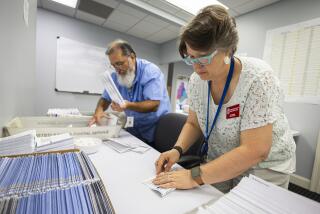Tijuana’s troubled crossroads
I used to live in Mexico, but I have to admit I was a bit nervous about going back.
In the months since I returned to the United States from Mexico City, I’d been reading about the drug wars in Tijuana and the horrors of the cartels, which routinely kidnap and behead people.
But as the trolley from San Diego approached the border, the two Mexican young women across from me seemed completely unconcerned. They were going back home after a day of work in the U.S., and they were talking about boyfriends.
“My cousin, she said she would only marry somebody rich,” the first young woman said in Spanish. “And she ends up marrying this guy who has no money at all. They don’t even have a car.”
The second young woman nodded. “All I want,” she said, “is to marry someone who loves me . . . as long as he has a good job.”
A few minutes later, I fell in behind them in line, walking up the long ramp and across the pedestrian bridge that leads to Mexico. The young women kept chatting. They walked quickly toward the war zone.
No, I didn’t hear any gunfire during the day I spent in Tijuana. But I did see two Mexican sailors in camouflage at the border gate, dressed in Kevlar lest some cartel hit man stage an ambush. Just a few yards away, a U.S. Department of Homeland Security van was escorting a half-dozen deportees to a special gate in the fence.
“That’s Mexico, and this is the United States,” a U.S. agent told me once he’d locked the gate after the last of the deportees had passed through. The deportees sat down on the Mexican side of the border and began lacing their shoes.
This is what passes for everyday life in Tijuana. You get a little love, a little immigration and small hints of the lawlessness that grips certain neighborhoods in the city beyond the border fence.
Tijuana is a crossroads city that remains, as it has been for ages, a chief battleground in the undeclared economic and cultural conflict between Mexico and the United States.
For returning Mexican immigrants who’ve been in the U.S. illegally, Tijuana is the first step on the road home. There are many such migrants these days, and I climbed into a taxi and headed for the central bus station to go talk to some of them.
It was a Wednesday afternoon and there were a dozen or so people at the station, all waiting for buses headed southward.
Ignacio, 28, gave an odd grin when I asked him where he was going.
After eight years in Orange County, he said, he was heading home to the southern state of Guerrero. “I’ve been deported seven times and I’m not going to try and cross again,” he told me.
He was detained last year by U.S. immigration authorities. Each time he tried to get back to Santa Ana, the Border Patrol got him. He spent two months in immigration detention. Finally he gave up -- and he seemed liberated by the thought that his U.S. days were behind him.
“Over there, in my town, you have more freedom than you have in Orange County,” he said.
And while Guerrero is one of the poorest corners of Mexico, no one fears the migra there. Even now, in contrast to the barrios of Southern California, there is little street crime in rural Mexico.
Besides, Ignacio said, the restaurant where he worked had cut back his hours.
People like Ignacio came to California seeking the kind of social mobility unavailable to the poor in Mexico, where economic class is a rigid construct held in place by overt racial discrimination and an overburdened public education system.
For years, the Mexican government has done nothing to discourage poor people from leaving their country. If they were going to try and stop the exodus, the central bus station would be a good place to start.
But the only official sign of such an effort there is a poster -- next to the front door. It shows a smuggler’s trail running through the desert and warns of the dehydration and death that await illegal crossers: “There are roads that have no way back.”
The Mexican government knows a poster won’t stop a single person from risking it all to reach the Promised Land. It’s barely a try.
Immigration, after all, serves as a safety valve to keep the pressure cooker of Mexican inequality from exploding. For decades, the steam has vented steadily northward from Tijuana and other border towns.
Now the pressure is starting to build again. There is a deep recession in the Promised Land, which means fewer people at the bus station headed north into the United States and more headed south into the Mexican interior.
Gilberto Cruz, 38, told me he expected something better when he arrived in San Diego last May from central Mexico. “You hear a lot of stories,” he said. Among other things, he’d heard the U.S. was a place where a day’s wages could equal a month’s salary back home.
Cruz had left his village near the city of Toluca, where he worked shucking corn to feed calves. It was hard work for little pay. In California, he expected hard work but much better pay.
He got temp work gardening, and planting little palm trees in breezy San Diego was more pleasant than shucking corn. The problem was he didn’t get to do it very often.
“Most weeks, I’d work one or two days,” he said. “It’s not worth being away from your family if you’re not even working.
“I’m not going to let anyone tell me any more stories” about the United States, he told me. “I’ve been there.”
We Mexicans and Americans are neighbors, and now we’ve both caught the same recession bug.
As we wait for a cure, we Americans are beginning to understand how our own excesses made us sick. In Mexico, too, it’s a time for reflection. Perhaps more people will stay in places like Guerrero and fight for their own share of medicine.
Cruz waited without complaint for the bus home, a ride that would take 45 hours. When he got there, he said, he would enjoy some home-cooked mole and the breezes that whistle through the pine trees of his mountain village.
A short while after bidding Cruz goodbye, I too turned toward home, trying to get back to my own complicated and imperfect country before dark.
--
More to Read
Sign up for Essential California
The most important California stories and recommendations in your inbox every morning.
You may occasionally receive promotional content from the Los Angeles Times.











